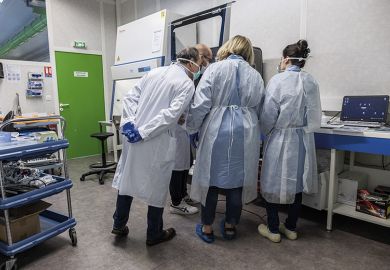Scientists have been called on to defend long-term, curiosity-driven research after the president of the European Research Council (ERC) was ousted from his post this week for trying to launch an emergency coronavirus funding programme that would have upended the body’s blue-skies mission.
Mauro Ferrari resigned on 7 April after just three months in post with a sweeping attack on the ERC and the entire European Union, saying he had “lost faith in the system itself” after the ERC’s scientific council rejected his proposal for specific funding to combat the novel coronavirus.
But the scientific council, a 20-strong group of eminent academics who steer the body’s funding strategy, hit back the following day, saying it had in fact called for Professor Ferrari’s resignation almost two weeks earlier.
It cited a litany of his failings that pre-date the pandemic, including spending too much time in the US and on outside projects and showing a “complete lack of appreciation for the raison d’être” of the ERC: “bottom-up” research on topics suggested by academics, as opposed to “top-down” efforts dictated from above.
Creating headlines around the world, the row has further inflamed the question about the extent to which funders and individual scientists should jettison existing structures and projects to fight the coronavirus.
Following his resignation, Professor Ferrari told Times Higher Education that he was “fully committed” to bottom up-research and had suggested only a “temporary” coronavirus “special programme” to “complement” the ERC’s normal activities.
“When the neighbours’ house is on fire, I will always jump in to do anything I can to save them and extinguish the fire,” he said in an email from the US, where he said he had been stuck for close to a month because of travel restrictions.
But research and university organisations have overwhelmingly backed the ERC in holding the line and sticking to its “bottom-up” research mission, and some were scathing about Professor Ferrari’s actions. “Mauro Ferrari tells his own story to justify his resignation,” said a statement from the League of European Research Universities.
Critics of Professor Ferrari point out that the ERC is just one part of the EU’s research effort, and that short-term, directed funds to fight the coronavirus have already been unlocked.
The ERC has also allowed grant holders to pivot their work to tackling the coronavirus when helpful. “Researchers were anyhow changing gear within funded projects to deal with the Covid-19 crisis,” said Dame Athene Donald, professor of experimental physics at the University of Cambridge and a former ERC scientific council member.
Helga Nowotny, who was president of the ERC from 2010 and 2013, said the “worst thing that could happen” would be to abandon research projects with a long-term perspective in a rush to address the crisis.
“You can repurpose a lab to some extent, but you can’t repurpose an institution [like the ERC] from one day to the next,” she said.
James Wilsdon, professor of research policy at the University of Sheffield, who has described Professor Ferrari’s resignation as “epic-scale flouncing”, said “research funding is primarily a long game. It’s not a rapid-response mechanism.”
“Should all organisations turn all funding efforts to this one virus? Clearly that would be insane,” he said.
Professor Ferrari had tried to turn the ERC’s mission “on its head”, Professor Wilsdon said, and instead of departing quietly when asked to resign had chosen to “go out onto the attack”.
“It’s quite proper that we have a debate about how we set research priorities,” he said. But, he added, “the people who are going to come up with the immediate response [on treatments or a vaccine] have been working on it for months”.
Questions are now being asked about how Professor Ferrari, a nanomedicine pioneer with dozens of patents to his name who spent most of his career in the US, was appointed ERC president in the first place. Professor Nowotny, one of the search committee members involved, said his performance at interview had been “perfect”.
“We thought, here’s someone who might bring back something from the US that would be good for Europe. A bit of entrepreneurial spirit,” she said.
An excellent communicator, he nonetheless lacked a knowledge of how the EU worked, she said. “He was unable or unwilling to learn how the EU or the ERC functions. You have to get into details,” she added.
The pool of candidates lacked some eminent UK scientists who would have applied had it not been for Brexit, Professor Nowotny added.
POSTSCRIPT:
Print headline: Keep eyes on blue skies, ERC urged
Register to continue
Why register?
- Registration is free and only takes a moment
- Once registered, you can read 3 articles a month
- Sign up for our newsletter
Subscribe
Or subscribe for unlimited access to:
- Unlimited access to news, views, insights & reviews
- Digital editions
- Digital access to THE’s university and college rankings analysis
Already registered or a current subscriber?







